In 2011 The Fred Hollows Foundation, recognising the rapid increase in population ageing, especially in the Asian region, decided to collaborate with the Burnet Institute in a program to evaluate integrated approaches to addressing eye health for older people.
The Sri Lankan Ministry of Health is currently implementing new strategies to prevent and manage the high and rapidly increasing rates of chronic non-communicable diseases and Sri Lanka has an active Vision 2020 program that addresses specific causes of blindness.
In 2011 consultations were conducted in Sri Lanka with key stakeholders. There was great interest and the current Program builds on an earlier healthy ageing project in Nuwara Eliya district, Sri Lanka.
The Better Vision, Healthy Ageing Program aims to explore how to address the existing need for glasses, cataract surgery, and other eye health care services, and to bring eye health services closer to communities by using the platform of Elders’ Clubs for eye screening and health promotion activities.
July 2012 to June 2015
Rationale
Sri Lanka has one of the fastest ageing populations in Asia. The proportion of elders is now increasing quickly because Sri Lanka achieved longer life expectancy and reduced birth rates soon after independence. In 2015, 12.4 per cent of the population in Sri Lanka was over the age of 60 years; this is estimated to reach 28.6 per cent by 2050. Population ageing is happening at a much faster rate than occurred in richer countries.
Older people contribute significantly to their families and communities in emotional, social and economic ways. But disability and illness undermines their ability to contribute.
Eye health problems, especially cataract and refractive errors, are more common among older people. Globally, more than 82 percent of the estimated 39 million people who are blind are older than 50 years. Women have a higher risk of visual impairment than men.
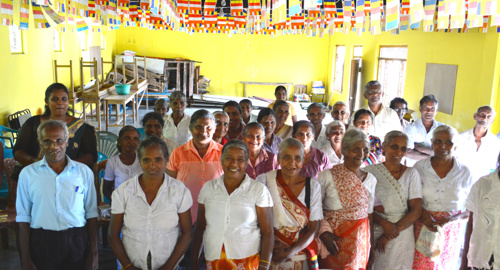
Recent national survey data shows that the prevalence of blindness in Sri Lanka increases with age: 2.3 per cent aged 50 years and above, 4.0 per cent aged 60 years and over and 8.4 per cent aged over 70 years. There has been a great increase in diabetes, high blood pressure and heart disease. This is the result of new lifestyles and diets, as well as the increasing average age of the population. Diabetes, high blood pressure and heart disease increase the likelihood of eye problems.
The impact of poor vision is greater on older people. They are often poor. They often have to cope with other health problems or disabilities. And they often have difficulties in reaching health care services.
Good sight enables better quality of life and allows older people to continue to play an active role in their families and communities. Social participation protects against many chronic non-communicable diseases and ageing-related conditions.
Poor vision increases the burden of care on families, especially women, and makes it more difficult for older people to prevent and manage their physical and mental health problems. The desire to keep their vision can encourage individuals to prevent and better manage diabetes and high blood pressure.
Most causes of poor vision, such as cataract and lens problems, can be solved with a simple operation or spectacles. A few older people have eye problems that cannot be improved. But they can be helped in other ways to make their lives easier.
There is a need for more attention to eye health by elders, their families, their communities and government services. Investing in healthy ageing and better vision will contribute to achieving the Sustainable Development (SDGs).
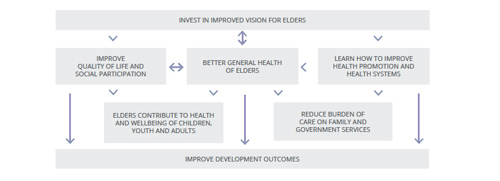
The program aims:
- To learn how healthy ageing strategies, such as the establishment of Elders’ Clubs, peer education, and training of health care and social welfare providers, can contribute to the prevention and management of eye health problems
- To learn how healthy ageing strategies, such as the establishment of Elders’ Clubs, can contribute towards the quality of life and health status of elders
- To contribute to the integration of prevention and management of eye health problems within the general health system
- To contribute to government efforts to re- orient health systems and services towards the needs of elders, and the prevention and management of chronic non-communicable diseases (NCDs). For example: procurement systems need to include glasses, intra-ocular lenses for treatment of cataract, and essential eye medicines; health information systems need to include recording of visual acuity and eye screening; and health worker training, and referral and treatment protocols need to include eye health
- To advocate for greater attention to vision within the international agenda for NCDs and healthy ageing
- To advocate for greater recognition that good vision contributes significantly to active and healthy ageing
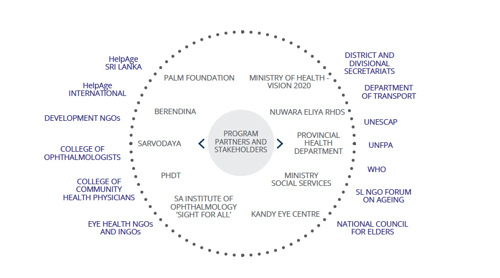
Downloads
Program Summary (2.67 MB)
Introduction to the BVHA Program Toolkit (1.19 MB)
Guide to Establishing Community Elders' Clubs (6.12 MB)
Framework for Activities for Elders' Clubs (772 KB)
Guide to Using Picture Cards for Health Promotion (10.2 MB)
Vision Health Promotion Messages for Elders (1.01 MB)
Guide to Community-Based Vision Screening (6.36 MB)
Guide to Community-Based Glasses Provision (3.22 MB)
Before, During and After Your Cataract Surgery (1.46 MB)
Guide to Mainstreaming Ageing in Development Programs (3.8 MB)
Ethical and Practical Guidelines for Working with Elders (963 KB)
Actions to Address the Growing Burden of Avoidable Blindness Among Elders in Sri Lanka (1.06 MB)
Issues of Ageing and Blindness: Information Sheet (112 KB)
Useful Articles - Active Ageing (1.4 MB)
Useful Articles - Chronic Non-Communicable Diseases (1.38 MB)
Useful Articles - Disability (1.39 MB)
Useful Articles - Eye Health (1.39 MB)
Program Components
Component One: Building Capacity for Service Delivery
- Strengthen capacity for the prevention and care of eye health for elders in an integrated manner in Nuwara Eliya district in Sri Lanka
- Contribute to addressing the existing need for cataract surgery and glasses among elders in Nuwara Eliya district
It is an important principle that research and advocacy programs should be accompanied by service delivery. The program focuses on strengthening capacity for eye health service delivery throughout Nuwara Eliya district, consistent with the strategies of the Vision 2020 National Programme for Prevention and Control of Avoidable Blindness in Sri Lanka (2007–2012).
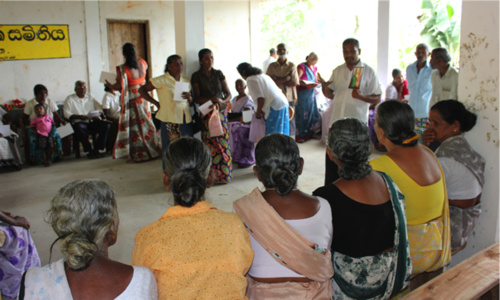
Component Two: Health Promotion Through Healthy Ageing Strategies
- Encourage and support attendance for vision screening, referral to specialist eye care services, and treatment of eye disease
- Address transport and communication issues related to eye health service provision
- Raise awareness about prevention and management of chronic NCDs which predispose to vision problems, especially diabetes
- Encourage support for visually impaired or blind elders
- Improve social participation and quality of life of elders
- Support preparation for healthy ageing and good vision into old age
The key strategy for achieving component two is provision of support for establishing community- level Elders’ Clubs. The Elders’ Clubs program provides opportunities to reach elders with vision screening and referral for cataract surgery, glasses or other eye care, and facilitates the discussion of eye health promotion messages. The program has identified, trained and supported peer ‘Eye Health Promoters’ (EHPs), a novel approach to stage one vision screening of elders in the community, and peer education and health promotion. Activities are consistent with the Vision 2020 Sri Lanka National Plan, the Sri Lanka action plan Mobilising commitment and action to address non communicable disease 2011, and the Sri Lanka National Action Plan on Ageing 2011 – 2015.
Component Three: Research
- Evaluate new strategies for active and healthy ageing with improved vision
- Undertake studies within the program to answer specific questions of importance to the Ministry of Health and the Ministry of Social Services
- Disseminate the findings widely in order to influence policy and practice
Component Four: National and Regional Advocacy for Vision and Healthy Ageing
- Raise awareness of the high prevalence and significant impacts of low vision among elders
- Showcase a best practice example of the potential of healthy ageing strategies, including Elders’ Clubs, to contribute to better vision for elders
- Advocate for the need to integrate vision into primary health care policies and practices which address chronic NCDs and healthy ageing
Funding for this program is provided by The Fred Hollows Foundation.
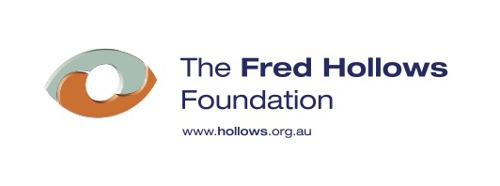
Funding Partners
The program is funded by The Fred Hollows Foundation. Burnet Institute’s Centre for International Health provides technical advice and support and manages the program.
- The Fred Hollows Foundation
Partners + Collaborators
- The Ministry of Health Vision 2020 Program
- The Ministry of Social Services
- Plantation Human Development Trust
- PALM Foundation (lead implementing partner)
- Sarvodaya Nuwara Eliya Regional Health Directorate
- Kandy Eye Centre, General Hospital, Kandy
- Provincial Department of Health Services
- Provincial Department of Health Services, Central Province
- South Australian Institute of Ophthalmology, ‘Sight for all’

